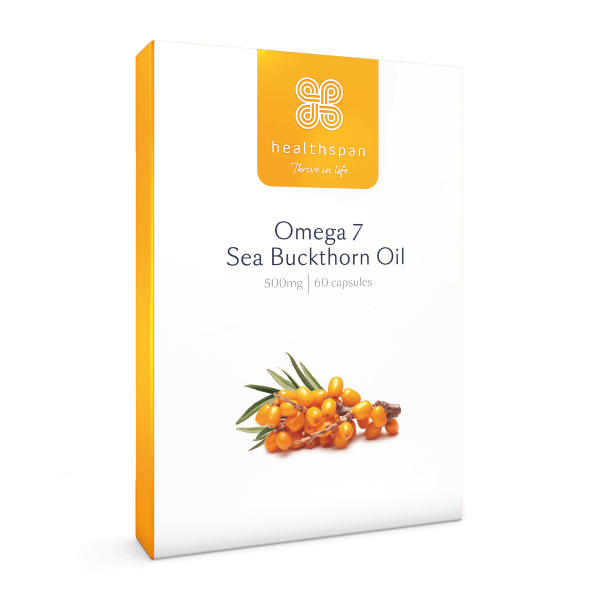Sea buckthorn oil is full of nutrients, particularly omega unsaturated fatty acids. Jane Collins examines how this coastal shrub can support your health.
🕒 5 min read
Sea buckthorn oil is derived from a shrub found on coastlines across Europe and Asia. Extracted from its bright orange berries, seeds and leaves, the oil has been used in Ayurvedic healing and traditional Chinese medicine for centuries.
The berries are also used in jams, preserves, juices and teas, but as well as being used as a food and traditional medicine, sea buckthorn oil is also regularly used in skincare and hair care products, and its particularly potent hydrating properties have been increasingly investigated for medicinal purposes.
Studies so far have been small, and many of them have been carried out on animals, but there is growing evidence to suggest that sea buckthorn oil supplements could have many healing benefits including improving the health and lubrication of the eyes, mouth, skin and vaginal tissue. Here's why.
It's a rich source of nutrients
Amazingly, the fruit, seeds and juice of sea buckthorn have been shown to include over 190 bioactive nutrients. The berries are particularly rich in antioxidants and vitamins such as A, C, K and E, and they also contain the minerals iron, magnesium, calcium, potassium, copper and zinc.
Sea buckthorn oil is also thought to be one of the few plants that contain all four omega unsaturated fatty acids – 3, 6, 7 and 9 – with particularly high levels of omega 7. It's these rich fatty acids that make sea buckthorn so unique and appear to hold the key to its ability to maintain and improve hydration and lubrication in the body.
It's also a good source of plant sterols, which are known to provide heart health benefits by helping to reduce cholesterol and possibly lower blood pressure.
It helps relieve dry eyes
The natural lubricating properties of sea buckthorn oil appear particularly helpful in those suffering from dry eyes. This is something that affects almost all of us – particularly if we spend a good chunk of the day staring at a computer screen, when eyes can become easily dry and red, and feel gritty and irritated.
Looking at any sort of digital device makes the eyes work harder as we tend to blink less frequently, and tears are essential for lubricating and nourishing the eyes. Dehydration can compound the problem, for example if you are not drinking enough fluids or are menopausal, when declining oestrogen causes everything to become drier.
Sea buckthorn oil has been shown to be particularly beneficial in treating dry eye – a condition where your eyes don't produce enough tears. One study showed that taking 2 g of sea buckthorn daily for three months helps to relieve red sore eyes and the feeling that the eyes are burning – commonly associated with dry eye.
Another study showed that supplementation with sea buckthorn had a beneficial effect on dry eye. This is attributed to the carotenoids, which break down into vitamin A in the body (essential for eye health) and tocopherols (a type of vitamin E, and understood to have an anti-inflammatory effect.) A further study showed that topical use of sea buckthorn oil, sprayed onto closed eyelids, also helps to relieve dry eye.

Your guide to eye health, with Dr Hilary Jones
Dr Hilary Jones outlines the eye health conditions to look out for, and what you can do to maintain good eyesight for longer.
It could help sun-damaged and prematurely aged skin
The rich content of natural unsaturated fatty acids makes sea buckthorn oil a particularly potent moisturiser, which may also have anti-ageing benefits. Its natural carotenoids beta-carotene and lycopene are converted to vitamin A in the body, and help to prevent cell damage and protect the skin from pollution and UV damage. It also contains vitamin E, which is commonly used to treat sun-damaged skin and reduce premature ageing.
Omega 3 and 6 have also been shown in mice to suppress the production of melanin and so reduce hyperpigmentation or so-called 'age spots'. Evidence also shows that regular consumption of omega 7-rich sea buckthorn oil increases the skin's thickness and improves its collagen content – think of collagen as your skin's support structure, the 'scaffolding' that helps to stop it sagging and wrinkling.
The antioxidants in sea buckthorn also play a key role in helping to protect the skin. Oxidative damage such as that caused by UV light and pollution put the skin under almost continuous stress, and are major causes of premature ageing. Sea buckthorn is also rich in natural tocopherols: a form of vitamin E found in plant oils that serves as a powerful antioxidant.
It can help ease dry skin conditions
Sea buckthorn is known to contain a high proportion of omega 7 (palmitoleic acid), which is also found in the fat of human skin. This ingredient has led to sea buckthorn being used traditionally to help speed up the healing of burns and wounds, and why much investigation into it has tended to focus on its skin-healing abilities and benefits in treating dry, flaky skin conditions such as eczema and dermatitis.
Evidence shows that taking sea buckthorn extract helps reduce psoriasis lesions when compared to a placebo. Several studies have shown significant improvements for people with atopic dermatitis.

Omega 7 Sea Buckthorn Oil
High levels of omega 7 and rich in omega 9 fatty acids
- 190 mg omega 7 and 35 mg omega 9 fatty acids per capsule
- Added vitamin A to support skin and mucous membrane health
It can help reduce vaginal dryness
For women, menopause tends to be the trigger for almost every bit of the body becoming drier – a result of the drop in oestrogen levels drying out the mucous membranes. This not only makes for drier skin, eyes, ears and hair, but can also make vaginal tissue become drier and sex potentially uncomfortable.
A study involving postmenopausal women showed that taking a daily sea buckthorn supplement helped to improve the condition and hydration of vaginal tissue, and provided significant benefits when compared to a placebo. This can also make it an effective alternative for women who cannot, or don't want to, take HRT.
How much should you take?
There is no official recommended amount, but one or two 500 mg capsules daily (taken together or as a divided dose) is suggested as a safe dose.
Who shouldn't take it?
There are few recorded side effects of taking sea buckthorn oil and it appears to be safe. However, it is thought that it could act as a blood thinner and so should be avoided if you take blood-thinning medication such as warfarin. Also avoid if you are pregnant or breastfeeding, as there is not enough reliable information to prove its safety.








